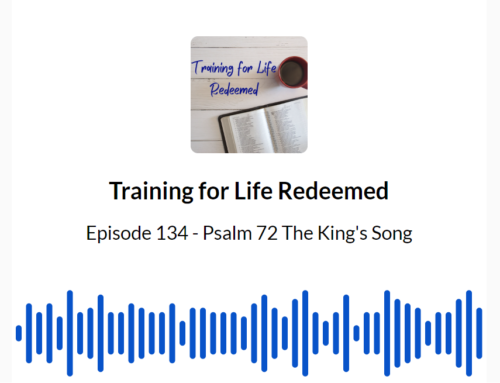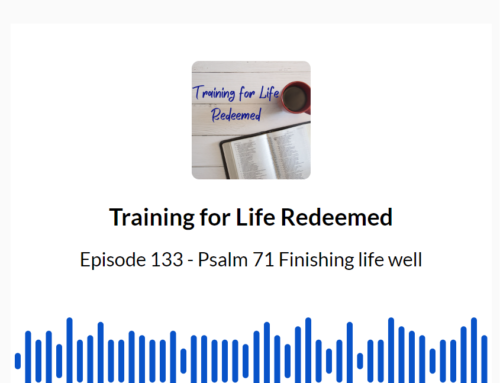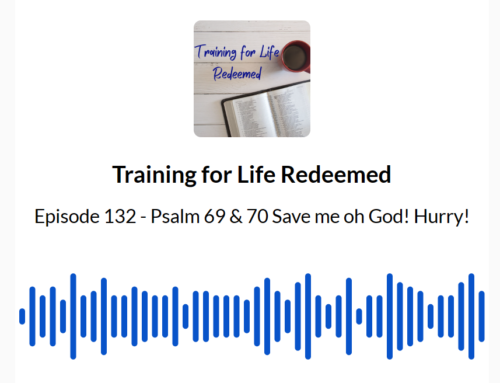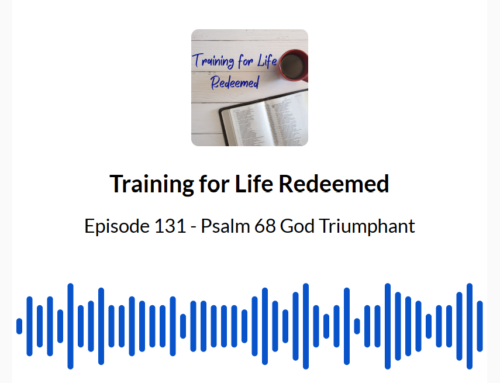When all is said and done, Yahweh puts the accusations to Job. Job maintains his faith. He does not repent but relaxes and is comforted on the dust and ashes. His accusers then turn to him as their mediator as they repent and seek God’s forgiveness. No accusation can stand against God’s redeemed people.
Grab your notes for this episode by completing the form
and we will send you the link to all our notes.
Transcript
Dan: (00:00)
Hi, everyone. And welcome again to training for life redeemed. I’m your host, Dan, and as always, I’m joined by my father, David Jackson. We’ve been working our way through Job. Dad has written a whole book on Job. If you would like to check out that book, make sure you come over to the website. You can get the study notes too. At the website, just come to trainingforliferedeemed.com/55, and there’ll be links and stuff there to go and buy his book and to, grab your study notes and stuff. Now, Dad, we’ve finished all the debates Job’s had to deal with. These three friends and then Elihu the 17 year old popping up outta the crowd full of knowledge and knowing everything and not really say, and as a Elihu is finishing God shows up and begins to speak.
Dan: (00:48)
So Job has really stuck to his guns all through the long process of arguments constantly kind of repeating themselves. People saying you’re not blameless, Job. And Job’s like, yes, I am. You’re not. Yes I am. God said he was blameless and Job refuses to deny that the whole way through. So now that God shows up, why is he yelling at Job
David: (01:29)
Yeah. Poor old Job. You’d be, you know, I think every believer, looks, Jesus said to us, you know, you want to hear the words from God. Well done my good and faithful servant. Don’t you. And if, if we are following this story, you know, God says Job is blameless. He’s my model. Example, go test him, throw everything you like at him. He’s faithful, he’ll persevere. And he did. And to ridiculous lengths of abuse and mockery and you know, exaggeration, everything that you could possibly endure physically as well as socially and emotionally. And when God turns up, we are expecting, aah!, Finally, you know, God’s gonna come along and say the good words. And instead, the first words you hear are who is this? Who darkens counsel with words without knowledge, and you sort of go what? And so for the next few chapters from what was it? 37 to 42, it sounds like God is yelling at Job. And I think the three friends would be sitting back, listening to God, talk to Job and going, yeah, give it to him. When you go, go back and you reread this really carefully. It comes as a bit of a surprise. God doesn’t ever say, Job did the wrong thing.
David: (02:57)
God’s asks Job a series of questions. Now most of the questions are, why do you think I have to answer to you? You know, where were you when I created the heavens and the earth? Who do you think you are? The irony is, Job has been saying exactly the same thing all through his speeches God is God, I’m a man. I can’t go into God’s court. I can’t hold God accountable. You know, to begin to do that, I’d need a mediator who was big enough to stand between us. And that’s a ridiculous idea. I can’t imagine that happening, you know, but I, I need a mediator. I need a redeemer kinsman. Oh, and he God. Hmm. So he is worked that much out, but he’s never said I’m gonna bring God into my court. So God asks him these questions. And interestingly enough, when we check out each of those questions, they are the questions. The friends put to him there in the accusations, the friends made they’ve accused Job of darkening, counsel of not having any knowledge of being ignorant. They’ve accused him of finding fault with Almighty, Yahweh says, will the fault finding take the almighty to court?
David: (04:20)
And Job says, I’m minuscule. How could I come back at you? I put my hand on my mouth. I’ve spoken once I answered twice, I’m not adding anything. So Job is saying, you know, I’ve done none of these things. I’m just sitting here waiting for you to deliver judgment. The answer to my case is in your court. I don’t take you to court. I don’t declare you unjust. So God puts all of the accusations to Job that the friends have put. And Job’s answer is I’ve got nothing more to say. I didn’t say any of that.
David: (05:19)
And you go back and you look at Joe’s speeches when he answers that charge and he answers it specifically. Absolutely not. God is just, I’m blameless that doesn’t make God unjust. Dunno how that works. But it’s true.
David: (06:15)
And you, you know, and if you call ’em up to get in the award, their friends go, oh yeah, another one. And they’ll get they’ll cop a bit of flack. So I used to get the secretary down at the front office. I want you to summon. So and so to the front office in your most serious voice. And so you’d hear this voice, they’d say the name report to the front office and the whole playground would go what
Dan: (06:57)
Yeah. Right. So does God actually speak to the friends at all? Or just to Job? Not yet.
David: (07:02)
Dan: (07:05)
All right. Well, let’s start with, let’s go to verse six of chapter 42, cuz this doesn’t really make sense to me. If what you have been saying so far, you know, the Job is blameless that God is righteous. God Job is blameless. Then why is Job in 42 6 saying I despise my life and I repent on the dust and ashes, but the whole point was that he hadn’t done anything wrong. And now he’s repent. What is he repenting of if he hasn’t done anything wrong? Uh, or is there something else that we are missing?
David: (07:35)
I put this down to an absolutely dreadful translation
David: (08:35)
probably some translation like that, but my life will be in italics because those words aren’t in the original and that word reject is, is a, a really weird little word, because the same, there are two words that are spelt and pronounced the same way. One means to reject something. One means to melt. It’s sort of like our English word bear. You know, I bear my burdens. There’s a bear in the woods. You know, I don’t wander around with a bare chest.
David: (09:59)
So he’s oozing liquids coming out seven 16, I’m falling apart. I’m melting.
David: (11:46)
So here, Yahweh has turned up. He’s been crying out for God to come and vindicate him. And his response is I melt and I’m comforted on the Dust and ashes. Now, if, if you want to translate this as repent, then go back to all those other places where God does it and, and God repents and go
Dan: (13:05)
Yeah. It’s almost like Job’s been weighing the whole way through, like when you’re talking about that whole idea of being comforted and the three guys are there to comfort him, but they don’t. And he’s constantly throughout the whole thing. There’s his comfort kind of theme throughout it. And at the end, he’s finally comforted by what God has said, because God hasn’t actually accused him of doing anything wrong. Just, you know, putting him in his place as
David: (13:43)
So all these people that have accused Job, those same accusations come at every Christian, they came at Jesus. I mean, there’s your blameless suffering servant. And he cops the same thing. He’s accused of blaspheming, God left right and centre. But Job God’s words to the three friends that are beautiful. You haven’t spoken of me What is right as my servant, Job did. So Job is everything Job said is right. So you can’t go back and say, Job did anything wrong. But the next thing he says is now you guys need forgiveness.
Dan: (15:11)
What about Elihu? Right. So the three friends that spoken to, they have to bring sacrifices and you know, Job prays for them. If God doesn’t mentioned Elihu does that mean a Elihu then was right. That he was that he didn’t do the wrong thing or that he does. He need to do the same sacrifices.
David: (15:27)
It really means that a Elihu is just ignored. He doesn’t count. He’s not one of the men he’s treated as a child, which is sort of a good payback for a bloke. Who’s, you know, heads a little bit bigger than his shoulders, but you, you get the picture, you know, if you wanna abuse my people, you and, and charge them with all this, you are the one who needs forgiveness. And the way to get forgiveness is through my people. Yeah. You need a blameless mediator. Uh, so go talk to Job.
Dan: (16:08)
Yeah. These days probably more.
David: (16:10)
Probably more, my sister raises is cattle. You know, she sells ’em at $2,000 ahead.
Dan: (16:52)
We’re living fairly long. I’m sure there’s Plenty of time.
David: (16:54)
Yeah, maybe, but, but another 10 kids, seven sons, three daughters. I mean, there, there’s a justice about this in the vindication as well. Public display that this is my man. and that’s wonderful. what about us? Well, I think the best place to finish the book of Job, is Romans. and I think when Paul wrote these words, it was sort of his commentary feeding back off job and everything since. So let me just read this straight outta my Bible, Romans 8 31. What will we say to these things? If God is for us, who’s against us. He who didn’t spare his own son, but handed him over for us all. How will he not a with him, give us all things who will bring a charge against God’s elect. God’s the one who justifies, who is the one who will condemn Christ.
David: (17:56)
Jesus is he, who died. He was raised who’s at the right hand of God who intercedes for us. Who’s gonna separate us from a love of Christ. And then he runs through the list and concludes. We are more than conquerors through him who loved us. And I think that’s, that’s the gospel in Job. Isn’t it? Uh, you hang onto Jesus, all the accusations, all the flack, all the, you know, your house burns down. Everybody’s dead around you, but you hang onto Jesus because with him is eternal life. And if you lose that, even if you have everything else, it doesn’t matter.
Dan: (18:35)
Well, dad, thank you so much for taking us through the book of Job. Now, of course, if you would like to get the study notes for this episode, or you want to go and find Dad’s book Dad, your book’s called crying out for vindication, is that correct? That’s right. Yep. And so crying out of indication, you can probably find it on Amazon or in Koorong or something like that and purchase it from there. You can also grab the study notes that dad’s written specifically for this series. So you can grab all the, and the links to everything you can find at trainingforliferedeemed.com/55. If you enjoy this episode, if you enjoy this little series, please leave us a review. You, we would love you to subscribe as well and come back and join us net for our next episode. And Dad, I believe we are switching over now to the new Testament and we’re heading into Matthew.
David: (19:20)
We’re about to start Matthew’s gospel and that’s gonna be exciting.
Dan: (19:24)



